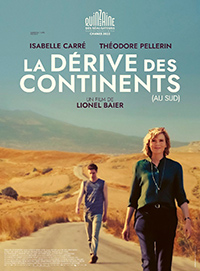Conventional Liaisons: Baier Leans into the Comedy of Crisis Through Familial Rift
 Swiss director Lionel Baier completes the third section of an intended four part tetralogy with Continental Drift (South). Following 2006’s Comme des voleurs (a l’est) and 2013’s Les grandes ondes (à l’ouest) and leaving just the North to complete his four corners, his continuation of European cross cultural identities continues with a mild comedy regarding the European Union. A light satire on bureaucratic lip service finds itself paralleled with the reunion of an estranged mother and son while the world is on the eve of shutting down due to the COVID 19 pandemic in early 2020.
Swiss director Lionel Baier completes the third section of an intended four part tetralogy with Continental Drift (South). Following 2006’s Comme des voleurs (a l’est) and 2013’s Les grandes ondes (à l’ouest) and leaving just the North to complete his four corners, his continuation of European cross cultural identities continues with a mild comedy regarding the European Union. A light satire on bureaucratic lip service finds itself paralleled with the reunion of an estranged mother and son while the world is on the eve of shutting down due to the COVID 19 pandemic in early 2020.
With such specific references to an overwhelming moment still shifting and redefining global routines, the immediacy of Baier’s latest may eventually obscure it. Unfortunately, Baier’s latest also has nothing new to reveal about an ongoing migration crisis or the cross-cultural political maneuverings throughout the EU and the mother/son focus zooms into sanitized banalities. Still, a pair of esteemed leading actors, Isabelle Carre and Ursina Lardi, are a pleasure to watch as they navigate the most interesting elements of the script as lovers and colleagues.
Nathalie Adler (Carre) is working as a liaison officer for the European Union, assigned to organize an upcoming migrant camp visit in Sicily to be attended by Angela Merkel and Emmanuel Macron. Scrambling to satisfy two emissaries from the European Commission, including Germany representative Ute (Ursini Lardi) and France’s Timotei (Ivan Georgiev), Nathalie unfortunately realizes this visit is meant to be a superficial photo op. As she scrambles to move the camp temporarily into a more squalid part of the infrastructure, she unexpectedly runs into her estranged son, Albert (Theodore Pellerin), working with an NGO. Having abandoned him when he was twelve upon embracing her sexuality, Nathalie has been struggling to reconnect with him. However, Albert has no interest in appeasing his mother. Meanwhile, Nathalie has a complex history with Ute, a sometimes lover.

While the metaphor of familial strife serving as microcosm for cultural estrangements throughout the EU has the potential to be interesting, it requires a subtlety not evident in Baier’s script, co-written by several notable cohorts, including directors Marina de Van (In My Skin, 2002), Laurent Lariviere (About Joan, 2022) and his recent regular collaborator, Julien Bouissox. The uneasy balance of comedy and tragedy is no easy feat considering the issues Baier is examining, which is why film’s like Haneke’s Code Unknown (2000) or Kaurismaki’s Le Havre (2011) or Jonas Carpignano’s Mediterranea (2015) tend to navigate immigration realities more successfully sans light humor.
Introductory sequences involving Carre’s liaison officer doing her liaising with German and French European Commission reps are entertaining, especially as we learn of her personal relationship with Lardi’s Ute (who steals every single one of her scenes). But then Baier’s film gets bogged down in the cliched relations of Nathalie and Theodore Pellerin’s truculent Albert. More of a rebellious teenager than angry young man who would be touting around Will Self, Pellerin’s characterization is limited to soapbox idealism without any interiority.
Isabelle Carre is warm and empathetic, but she’s also stuck in a stagnating merry-go-round as a guilty mother. Strangely inert considering the talent behind the script and Baier’s own lengthy filmography, it’s a film which struggles to parlay valiant, topical intentions into a cohesive, meaningful narrative.
Reviewed on May 22nd at the 2022 Cannes Film Festival – Directors’ Fortnight. 89 Mins.
★★/☆☆☆☆☆


